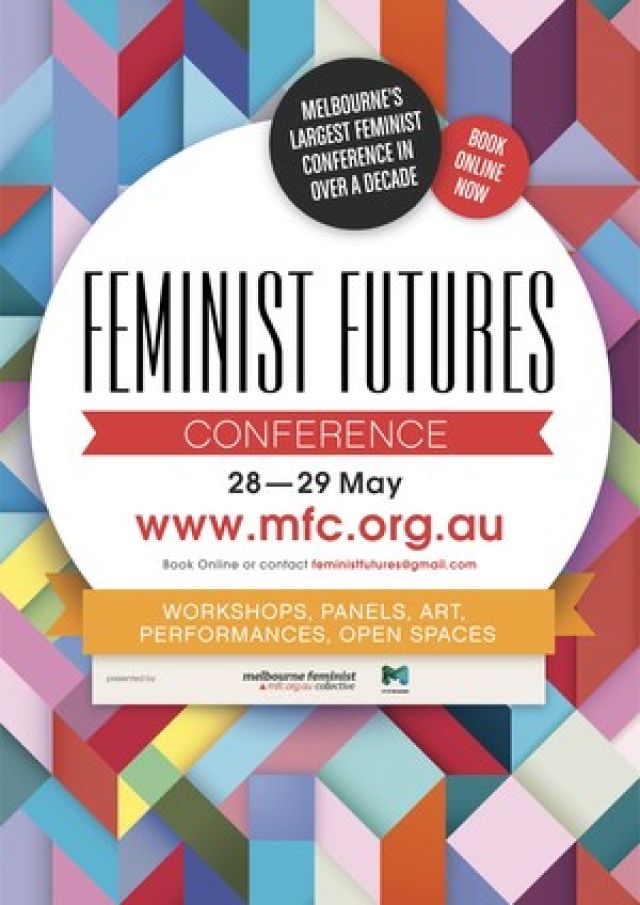
Melbourne's largest feminist conference in more than a decade, the Feminist Futures Conference, took place over May 28-29.
The conference was organised by the newly-formed Melbourne Feminist Collective (MFC), a group of mainly young activists who were inspired by a similar conference they attended in Sydney last year.
In the lead-up to the conference, a debate between the radical feminist supporters of Melbourne lecturer Sheila Jeffreys and the sex worker supporters of Elena Jeffreys broke out on the conference blogsite.
In the end, Sheila Jeffreys pulled out of speaking, alleging she felt threatened by a transgender man who was scheduled to speak on the same panel.
On the first morning, radical feminists promoting a rival conference at a nearby venue confronted people.
About 350 women and a sprinkling of men, some from interstate, attended the conference over the two days. There was a big attendance from younger feminists. One of the organisers opened the conference by saying the Feminist Collective had planned this conference to underscore the idea that feminism is not dead and to strengthen the visibility of the movement.
She said it was very timely for such a conference, after a federal budget that cracked down on society's most vulnerable, particularly single mothers.
The conference began with a welcome from a Wurundjeri Indigenous owner of the land, Auntie Di, and was followed by a panel of Indigenous women. The three speakers, Tracey Bunda, Paola Balla and Rebecca Gerrett-Magee felt that it was appropriate that they speak first because they represented Australia's First Nations.
They challenged those who questioned an Indigenous person's Aboriginality if they had light-coloured skin and outlined the continuing daily discrimination, disrespect and hardships Indigenous people, and women in particular, face.
They challenged those present to engage earnestly with and seek to build bridges with Aboriginal people.
They said dialogues must treat Aborigines as a sovereign people, as owners of the land, not as custodians of the land. Balla said: “Why should we reconcile? We haven't done anything!”
They said it was despicable to use the plight of children to get Aboriginal land and use Indigenous women to justify the Northern Territory intervention.
Raewyn Connell, Elena Jeffreys, Ludo McFerran and Alison Thorne spoke on the second panel titled, “Why Feminism Matters”. Each speaker tackled this question from a different angle.
Connell addressed the issue of violence against women and described the senseless, brutal crime of femicide or woman-killing in Mexico and the international campaign to stop it. She also talked about Veronnica Baxter, a transsexual woman sent to a men's prison in NSW where she died.

Connell said the rape allegation against the head of the International Monetary Fund was another example of a famous male caught abusing his position of power.
The media try to reassure us that we live in a post-feminist world where a woman, Gina Rinehart, is the richest person in Australia. But Rinehart, along with her male counterparts, demand the government cuts social services on which hundreds of women depend.
And, as a group, women still earn only 61% of what men in Australia earn.
Elena Jeffreys, speaking for the Scarlet Alliance (the Australian sex workers association), emphasised that feminism is for everyone, including sex workers. She said the Scarlet Alliance has been involved in more than two decades of education for sex workers, outreach work, financial help and industrial relations advocacy work.
Sex workers should be the health minister's concern rather than the police minister, she said. “Laws are unfair, they discriminate against and hurt sex workers and are open to corruption.”.
The third speaker, Ludo McFerran suggested the feminist movement had become very specialised and lost the big picture, which is why, she said, a conference like the Feminist Futures Conference was very important.
She said that we need to get big changes to the system. While we owe feminists of the past a debt, we now need a radical assessment of the movement.
She was happy that, in her opinion, there had been a shift to younger women in the movement. She felt that a core issue is “how we construct relationships” and that women finally need to get over romanticism — there is no “one” special person, there are in fact many special relationships women can have.
She suggested that we should cut the working week, for example by the time everyone reaches 30, when they should all, men and women, work part-time and spend time with children, their own or other people's. Poverty for older women was also of concern to her.
The final speaker was Alison Thorne from the Freedom Socialist Party. She described women's lived reality, where women earn 18% less than men, where single mothers must survive on very low incomes, older women live in poverty and 28% of all female workers experience sexual harassment.
Add the extra oppressions of Aborginal, lesbian, transgender or migrant women and the reality for most women is very difficult. However, she said it hadn't always been like this, that women's oppression began with the rise of private property and that women's free labour in the nuclear family remains essential to capitalism.
She added that Australia had a highly segmented workforce with much of the power now situated in offices, rather than, as in the past, in factories. Many women workers simply hadn't yet realised how powerful they potentially are.
Workshops offered topics including the equal pay campaign, lesbian activism, Palestine and pornography.